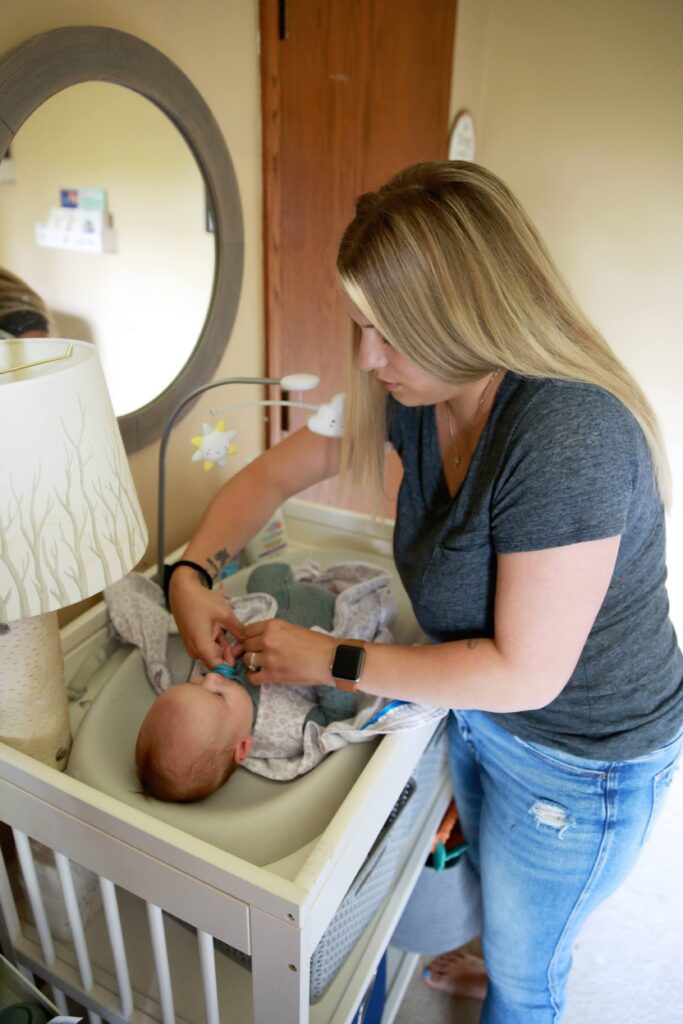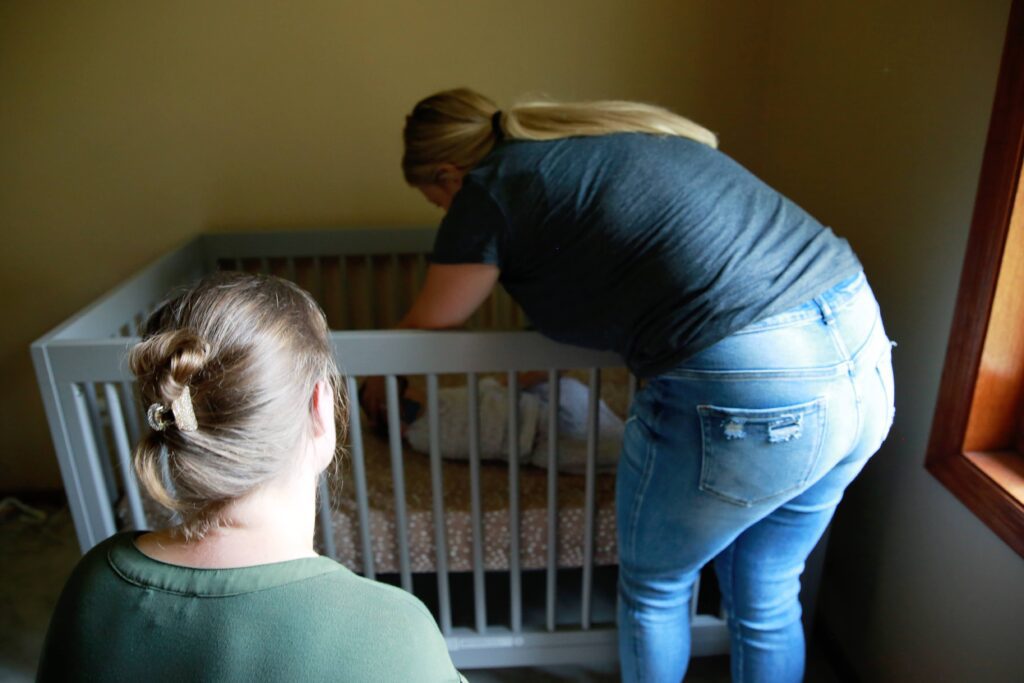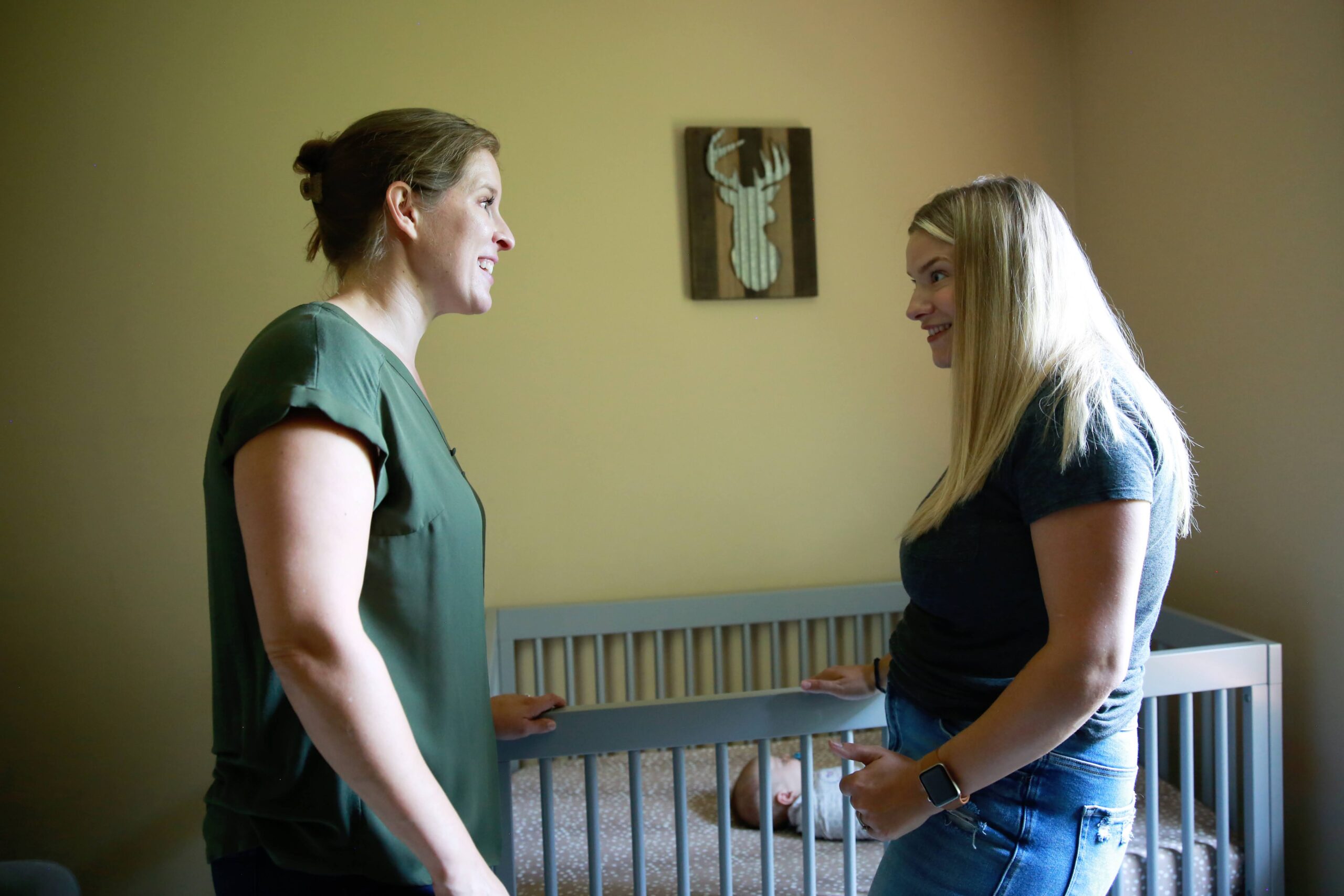Picture this: You’re running on three hours of broken sleep, your newborn seems to have a secret mission to never let you rest, and you’re wondering if you’ll ever feel human again. Meanwhile, you are getting messages of “just do Cry it Out!’ or “what did you expect?” from friends, families, the pediatrician and social media.
Trust me, I’ve been there – and I’m here to help.

The Honest Truth About Newborn Sleep Patterns
Let’s get real. Newborn sleep is nothing short of a beautiful, chaotic adventure. Forget everything you know about predictable sleep cycles – your tiny human is operating on a completely different wavelength:
• Predictability? More like controlled chaos until they approach 3 months
• Circadian rhythms are still a work in progress
• Nutrition is a priority over sleep in these early weeks
• Awake time is minimals (we’re talking 20-30 minutes max)

Cracking the Code: Recognizing Your Newborn’s Sleep Signals
Think of your baby as a delicate, complex communication system. They’re constantly sending signals – you just need to learn the language:
• Subtle eye rubs, red “rashy” looking forehead blushing
• Tiny, adorable yawns
• Turning away from stimulation
• Decreased movement
• That dreamy, unfocused gaze
When these signals appear, it’s your golden ticket to initiating the sleep routine. The sweet spot? Getting them down 20-30 minutes after waking up. In the first two weeks, sometimes there is no awake time at all.

Your Newborn Sleep Survival Kit: The Proven Techniques
Remember Dr. Harvey Karp’s game-changing 5 S’s? These are your secret weapons in the sleep battle:
1. Swaddle: Recreate that cozy womb environment
2. Side/Stomach position (always supervised)
3. Shush: White noise is your new best friend
4. Swing: Gentle movement works magic
5. Suck: Pacifiers or feeding can be incredibly soothing
I would add “6. Babywearing” to this very essential list of techniques. It’s so normal for newborns to need a lot of support to calm and soothe to sleep.
Feeding and Sleep: The Delicate Balancing Act
For these first two weeks, your world revolves around feeding:
• Embrace on-demand feeding – feed to sleep, feed when they cue, etc.
• Aim for feeds every 3 hours max, even shorter during daytime hours
• Don’t hesitate to wake a sleeping baby to get in feeds
• Priority: Consistent calorie intake over 24 hours

Teamwork Makes the Dream Work: Parental Sleep Strategies
Newborn care is a team sport. Here are two strategic approaches to help you and your partner survive – aiming to get at least 5 hours of sleep or in-bed time per adult to reduce symptoms of sleep deprivation:
Scenario 1: Early Days with a 5-Day-Old
Try this if your family is trying to optimize not only newborn but adult rest.
Feeding Rhythm:
• 8 am, 11 am, 1 pm, 3 pm, 6pm, 8 pm, 11 pm, 2 am, 5 am
Daytime Dynamic:
• One partner handles nursing (20-30 minutes)
• Other partner manages post-feed care: burping, changing, soothing
Night Shift Strategy (8 pm – 2 am):
• Nursing partner feeds and immediately rests
• Supporting partner manages baby transport and post-feed care
• Supporting partner sleeps during baby’s sleep cycles
Night Shift Strategy (Midnight – 5 am):
• Partners swap roles, nursing parent does it all
• Ensure each parent gets uninterrupted sleep blocks
• Bonus: Mandatory daytime naps for both
Scenario 2: Settling into a Rhythm at 4 Weeks
Try this if your babe is around 4 weeks old and capable of “one long stretch” of sleep.
Evolving Feeding Schedule:
• 8 am, 11 am, 2 pm, 5 pm, 8 pm, 11 pm, 3 am, 6 am, 8 am
Night Navigation (8 pm – 3 am):
• Chestfeeding partner feeds and immediately rests
• Supporting partner manages baby transport and care
• Supporting partner sleeps during quiet moments
Night Strategy (Midnight – 6 am):
• Partners rotate responsibilities
• Maximize individual sleep opportunities
• Prioritize recovery and shared support
When bottle feeding, either partner can be partner 1 or partner 2.

Your Roadmap to Sanity: Professional Guidance
Feeling overwhelmed? I got you. Take one deep breath and remember you aren’t alone when you know the love and support of Blooma. From support groups to workshops, yoga to the community that forms in the lobby, we have your back.
For those ready to learn more, I’ve developed a comprehensive “Baby Steps – Optimizing Newborn Sleep” online course that dives much deeper into:
• Practical sleep strategies for ages 0 – 12 weeks (other classes exist for older babies, too)
• Soothing techniques that actually work
• Realistic expectations for these early weeks
• Troubleshooting common sleep challenges
• Foundational skills to help your baby sleep through the night
Click here to learn more.
You’re not alone in this journey. With the right tools and support, you’ll navigate these challenging weeks with confidence, community and maybe even a smile.
Sweet Dreams,
Sarah Branion
Certified Professional Birth & Postpartum Doula
Pediatric Sleep Coach
Blooma







No Comments
Sorry, the comment form is closed at this time.